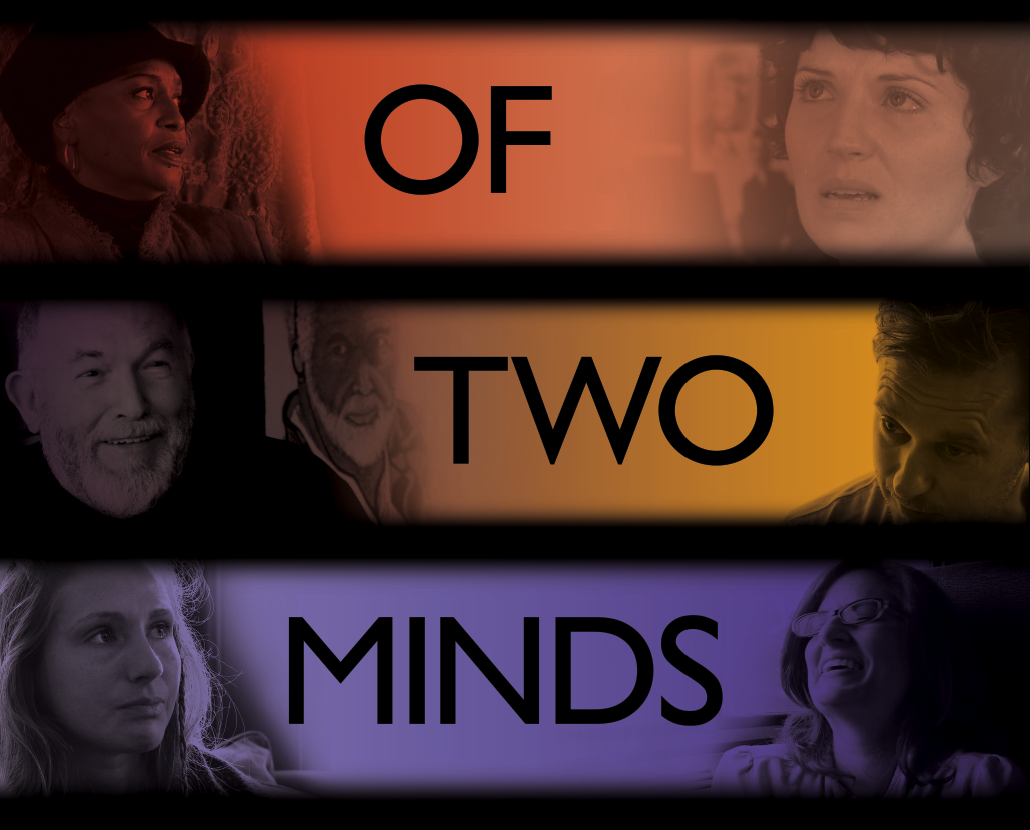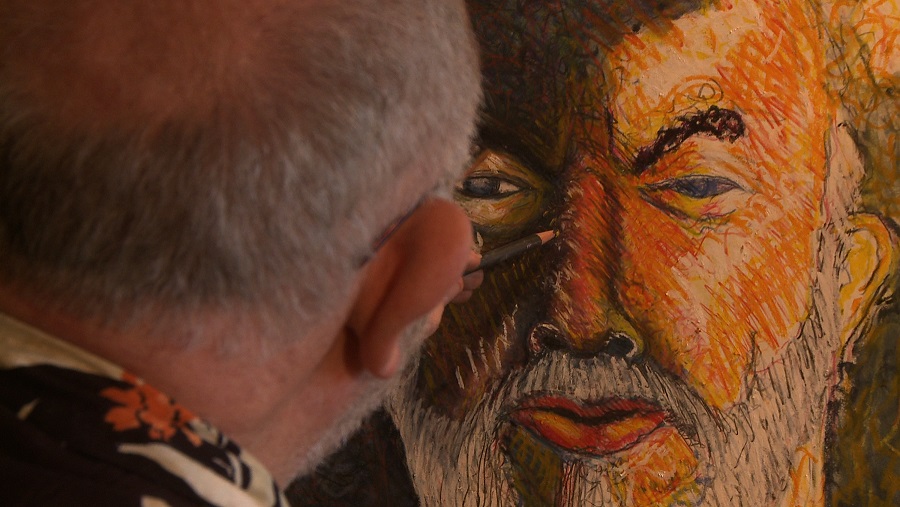| « Columbinus at ATC Extends Its Stay | Legends and Luminaries Celebrate WVON's 50th Anniversary » |
Film Sat Apr 06 2013
Of Two Minds Comes to Chicago

From April 8 and 9, Chicagoans will have the rare opportunity to see a screening of Doug Blush and Lisa Klein's critically acclaimed documentary Of Two Minds, which explores life with bipolar disorder, at Turning Point Behavioral Health Care Center in Evanston. The intimate benefit screening on Monday the 8th includes a hors d'oeuvres reception and conversation with award-winning filmmaker Doug Blush and Carlton Davis, one of the three main subjects featured in the film. Viewers will also have a chance to contribute to the awareness and treatment of mental illness by attending, as proceeds will benefit Turning Point's mission of making comprehensive, high-quality mental health care accessible to all. Then the film will have a free public screening at the Skokie Public Library on Tuesday, April 9th at 6:30pm.
From the creative team that brought you The Invisible War, Wordplay, I.O.U.S.A., Superheroes and These Amazing Shadows, Of Two Minds , over the course of three years, intimately follows the lives of three individuals, as well as their family and friends, who are diagnosed with bipolar disorder. The film's three main subjects include Cheri Keating, a high-profile LA stylist, Carlton Davis, a Pasadena artist, and Liz Spikol, a Philadelphia-based writer and journalist. Inspired by co-director Lisa Klein's sister, who struggled with bipolar disorder until her death at age 42, Of Two Minds is an attempt to bring awareness to the more than five million Americans diagnosed with bipolar disorder, who often suffer from social stigma, medical insurance nightmares, and, frequently, a fear of losing jobs and relationships that forces them to stay in the bipolar "closet," according to the Director's Notes.
Klein points out that one of the biggest misconceptions about bipolar disorder is the perception that it is not an illness. People use the word synonymously with the word "crazy" or say they had a "bipolar day" if they had a mood swing. Klein notes that while a person with diabetes could call off from work if they felt sick because they needed insulin, a person with bipolar could not call in if they felt depressed because people do not view bipolar as a disorder. They would be told to "buck up and get yourself together," as if depression is something that can be fixed with some coffee and a shower. For Blush and Klein, they hope that the film will really be a call for understanding, brought to light by all of the subjects whose varied experiences are explored. It is only by having an intimate understanding of the struggle of those with bipolar disorder that we can finally begin to change these perceptions.
Doug Blush and Lisa Klein have experienced great feedback about Of Two Minds so far, as well as some welcome surprises. We sat down for a phone conversation about their hopes for the film and their amazing journey in the process of making it.
Doug, you were the editor and associate producer of the Oscar-nominated film Invisible War, a documentary about sexual assault of military personnel in the US troops. That film led to not only increased awareness of the issue but also real policy change. Is that something you hope for with this film?
Blush: Absolutely, that is always the hope. The bottom line is when you have a message that you want people to pick up on, I don't think there's a better way these days than to use film or television. What we really want to do is break down the stigma of bipolar. At multiple screenings, people have come out to us, saying "Your film gave me the ability to tell people I have this," or "This is the first time I've been able to admit this to anybody; I haven't even told my husband or wife or daughter, and this gave me the ability." Even a reporter in Toronto interviewing me about the film came out after he saw it. It changed my whole worldview on bipolar and on mental illness. I've learned so much in the process of doing this.
In addition to helping people come out of the "bipolar closet," what kinds of effects do you imagine this film having?
Blush: I think people who don't have direct experiences with bipolar have only heard about it in the media. When this gets reported, it is usually celebrity scandals or news stories about people running around with butcher knives in public places "acting like 'maniacs." People rarely have those kinds of symptoms. The mentally ill are much more likely to be the victims of violence than the perpetrators. This film can give people hope that there are so many other stories to tell--that people can manage bipolar disorder and become great contributors to society and lead amazing lives.
Klein: Yes, we want people to feel less alone and see there are other people out there who are successful in the community. We want to foster compassion and understanding. We want to show that this is what is going on with them. This is what they are dealing with every minute of every day. We want to put a human face on bipolar disorder. We are all dealing with something.

Are there movies or TV shows out there that you think portray a pretty accurate picture of mental illness or bipolar disorder? Are there any that really, really fail?
Klein: Well, there's Silver Linings Playbook. I'm happy the movie was made, because it's shining some light on mental illness, but I have so many issues with it. It's all too easy. We give you the meds and it's okay. You marry someone else with mental illness. But I do like the Robert Deniro's character. He shows someone who has no idea what is going on. He is living with someone with mental illness and he is trying to figure it out. The other big one for me is "Homeland." I am blown away by Claire Danes. I feel like she has nailed it, from what I've seen from my sister, and from what I've seen in general.
Blush: Yes, those are the modern examples that really stand out. When you see Carrie Fisher doing her HBO special and talking about her experiences, in funny and tragic ways, that's what we try to do in the film as well. We wanted people to tell us what its like to live this. We didn't want it to be a clinical PowerPoint slideshow. People telling their stories, that's so amazing for us. We are tapping into shared experiences.
What surprised you while making the film? Did you find out things that you didn't expect?
Blush: Oh yeah, everyday. For Lisa it's different because she lived with her sister so long and she knew some of the moments that come with bipolar. For me, now I know lots of people, some from my distant past, with bipolar, because so many have come out to me after we made the film. Now I can look back at moments with them and realize, oh, that wasn't them having a bad day, or rejecting me--it was the condition. Many people think mental illness is just a continuous prison sentence of terrible things happening all the time, but some people just deal with their experiences in various ways--through treatment, therapy and other means--and have very full lives. At some points, they have really dark times; at other times, they can be amazingly creative and successful. A lot of creative people are bipolar, and they use their bipolar to fuel their art. It's not always a curse.
What are you looking forward to about the upcoming screenings on April 8th and 9th?
Blush: I'm so excited to be coming to Chicago for the Turning Point screenings. That organization and ones like it are doing such great work to break open the stigma and help people treat their illness themselves, work with their families, and change how we talk about these things. They give people hope. And we are bringing one of the subjects of the film, Carlton Davis, to the screening, which will be great as well.

Tickets are $70 to the intimate screening at Turning Point Behavioral Health Care Center 6-9pm at 27 Live, 1012 Church St. in Evanston on April 8. For reservations and more information call 847-933-0051 or visit tpoint.org.
Related Event: On Tuesday, April 9 at 6:30pm, Of Two Minds public screening at the Skokie Public Library, 5215 Oakton Avenue, Skokie. After the screening, Turning Point hosts a panel discussion with Blush and special guests. Admission is free. Continuing Education Credits are available. For more information call 847-933-0051 or visit tpoint.org.









Harold A. Maio / April 7, 2013 3:35 AM
an attempt to bring awareness to the more than five million Americans diagnosed with bipolar disorder, who suffer from social stigma
We make more and more progress, and still there someone, person, reporter, editor, who will promote a “stigma” to print and minds. See rape/stigma for a policy to apply. That vulgarity has ended, end this one.
Harold A. Maio, retired Mental Health Editor